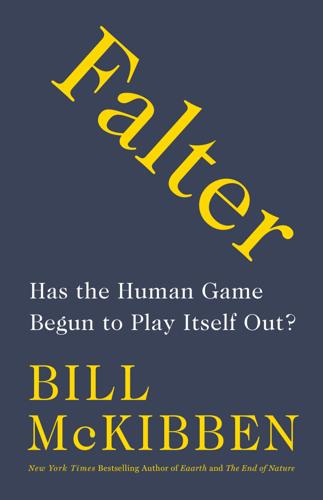
Falter: Has the Human Game Begun to Play Itself Out?
by
Bill McKibben
Published 15 Apr 2019
Perkins was one of the richest men on the planet. He had literally built one of the largest yachts on earth, the 289-foot Maltese Falcon (which carried its own submarine, which he named the Dr. No). But Perkins had noticed that the poorer people of San Francisco were demonstrating against the real estate takeover of their city by tech barons and venture capitalists like him—indeed, some unruly hooligans had dared to smash a piñata in the shape of one of the swank buses Google uses to ferry its workers from their urban lofts out to Silicon Valley. And so, Perkins thoughtfully wrote to the Journal to “call attention to the parallels of fascist Nazi Germany in its war on the ‘one percent’ namely its Jews, to the progressive war on the American one percent, namely the ‘rich.’”
…
But it seems to me that what I care most about is preserving a world that bears some resemblance to the past—a world with some ice at the top and bottom and the odd coral reef in between, a world where people are connected to the past and future (and to one another) instead of turned into obsolete software. And those seem to me profoundly conservative positions. Meanwhile, oil companies and tech barons strike me as deeply radical, willing to alter the chemical composition of the atmosphere, eager to confer immortality. There is a native conservatism in human beings that resists such efforts, a visceral sense of what’s right or dangerous, rash or proper. You needn’t understand every nuance of germline engineering or the carbon cycle to understand why monkeying around on this scale might be a bad idea.

Green Tyranny: Exposing the Totalitarian Roots of the Climate Industrial Complex
by
Rupert Darwall
Published 2 Oct 2017
By contrast with the feudalism of tech, fracking is democratic, spreading wealth more widely and evenly through job creation and higher incomes and generating massive consumer gains by reducing the cost of everything derived from hydrocarbons. Perhaps here we can discern a motive. Ostentatiously donning the cloak of green virtue diverts attention away from tech barons’ being targeted as the twenty-first-century’s robber barons. Seen this way, tech support for the Clean Power Plan is good business: a way of protecting the tech barons’ billions. It is, however, unambiguously bad for the business of America. Europe’s Energiewende is turning out to be a colossal engine of economic and social disaster. Damaging as they are for America, the implications of the Clean Power Plan go far beyond its economic consequences.
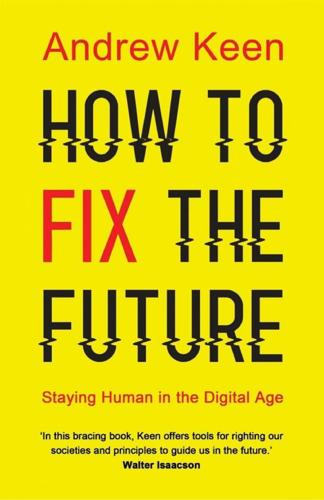
How to Fix the Future: Staying Human in the Digital Age
by
Andrew Keen
Published 1 Mar 2018
“If the leaders of these companies put the equivalent of just 1 percent of their profit, for five years, to the cause, local American journalism would be transformed for the next century.”16 Waldman is right to use Carnegie—the author of the influential 1889 article “The Gospel of Wealth,” a kind of More’s Law pamphlet for the rich that called on them to invest their wealth in improving society—as a role model for our twenty-first-century tech barons. In business, Carnegie was anything but an angel. His steelworks were the sites of some of the most violent labor clashes of the late nineteenth century. After a long history of union-busting in their factories, his partner Henry Clay Frick even hired an armed militia in 1892 to put down a strike at the Homestead, Pennsylvania, site; the confrontation resulted in the deaths of eighteen people.
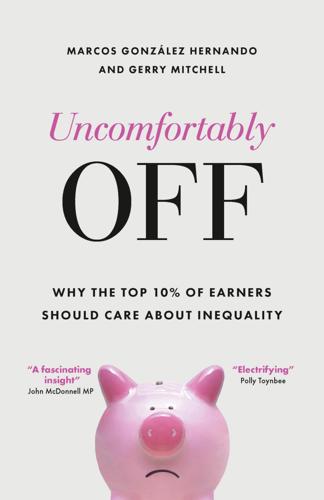
Uncomfortably Off: Why the Top 10% of Earners Should Care About Inequality
by
Marcos González Hernando
and
Gerry Mitchell
Published 23 May 2023
In the UK, you might not think of the working class of post-industrial northern England as privileged, but arguably they are compared to most in Eritrea. Similarly, a family of doctors from South America might be by many definitions well-off, but their income is minuscule compared with the fortunes of the tech barons of Palo Alto. Given both how laden and relative this issue is, it is easy to see why delimiting who is and who is not well-off is problematic. The lower boundary is always fuzzy, dependent on our vantage point, and riddled with danger. A 2016 Gallup poll in the US found that those earning under $20,000 a year and those earning between $150,000 and $250,000 both identified as middle class at similar rates (roughly 30%).4 All of this poses difficulties for anyone studying the relatively privileged.

Cobalt Red: How the Blood of the Congo Powers Our Lives
by
Siddharth Kara
Published 30 Jan 2023
The truth, however, was this—but for the demand for sugar and the immense profits accrued through the sale of it, the entire slavery-for-sugar economy would not have existed. Furthermore, the inevitable outcome of stripping humans of their dignity, security, wages, and freedom can only be a system that results in the complete dehumanization of the people exploited at the bottom of the chain. Today’s tech barons will tell you a similar tale about cobalt. They will tell you that they uphold international human rights norms and that their particular supply chains are clean. They will assure you that conditions are not as bad as they seem and that they are bringing commerce, wages, education, and development to the poorest people of Africa (“saving” them).
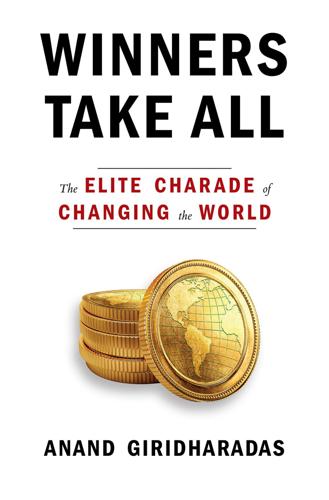
Winners Take All: The Elite Charade of Changing the World
by
Anand Giridharadas
Published 27 Aug 2018
Craig Shapiro’s writings and Venn diagram come from the website of his Collaborative Fund: www.collaborativefund.com/about (accessed September 2017). CHAPTER 3: REBEL-KINGS IN WORRISOME BERETS Blair Miller’s quote comes from an interview series called “Tastemakers,” published by the New York clothing boutique Otte (no longer available online). Danah Boyd’s critique of the tech barons is from her essay “It’s Not Cyberspace Anymore” (Points blog on Medium, February 2016). On the campaign against discrimination on Airbnb, see “Airbnb Has a Discrimination Problem. Ask Anyone Who’s Tried to #Airbnbwhileblack,” by Aja Romano (Vox, May 6, 2016). Airbnb’s report in response to the accusations is titled “Airbnb’s Work to Fight Discrimination and Build Inclusion,” by Laura W.

News and How to Use It: What to Believe in a Fake News World
by
Alan Rusbridger
Published 26 Nov 2020
<https://www.marieclaire.co.uk/life/work/madison-marriage-presidents-club-583371> Marriage, Madison. ‘Presidents Club trustees criticised by UK charity regulator’. The Financial Times, 12 July 2018. <https://www.ft.com/content/d17623b6-85cd-11e8-96dd-fa565ec55929> Marriage, Madison and Lizzie Cernik. ‘FT investigation: The darker side of a British tech baron’. The Financial Times, 23 October 2019. <https://www.ft.com/content/afffb542-f577-11e9-b018-3ef8794b17c6> Marriage, Madison and Matthew Garrahan. ‘Martin Sorrell’s downfall: Why the ad king left WPP’. The Financial Times, 11 June 2018. <https://www.ft.com/content/617147b4-6cda-11e8-852d-d8b934ff5ffa> Martin, Iain.
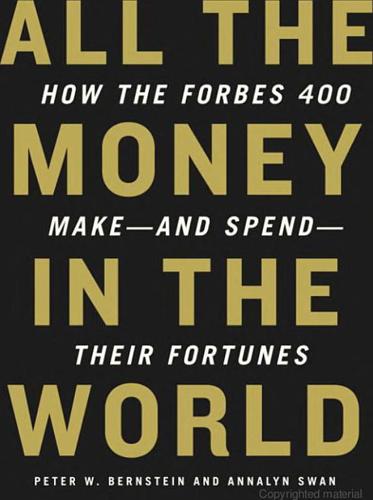
All the Money in the World
by
Peter W. Bernstein
Published 17 Dec 2008
Today Doerr has raised funds: Clive Thompson, “New York’s Very Weird Five-Year Forecast,” New York, Nov. 13, 2006. 55. “Green tech,” he believes: Terence Chea, “Doerr Firm Invests in ‘Green Technology,’” Associated Press, Apr. 10, 2006. 56. “Energy is subject to the same sort”: Laura Locke, “The Green-Tech Venture Capitalist,” Time, Oct. 23, 2006. 57. In 2006 VCs poured $727 million: Matt Richtel, “Tech Barons Take on New Project: Energy Policy,” New York Times, Jan. 29, 2007. 58. For his investment efforts: www.legalaffairs.org/issues/November-December-2005feature_skeel_novdec05.msp. 59. Between 1962 and 1966 he outperformed the top: “Brief History of Hedge Funds,” www.capmgt.com/brief_history.htm. 60.
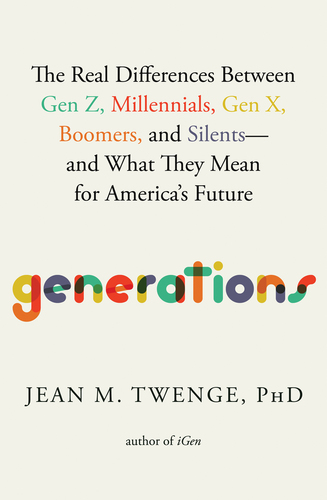
Generations: The Real Differences Between Gen Z, Millennials, Gen X, Boomers, and Silents—and What They Mean for America's Future
by
Jean M. Twenge
Published 25 Apr 2023
Marketers found this out the hard way: In 1993, when Coca-Cola tried to launch the alienation-themed OK Soda, presented in a drab gray can, it flopped. Considering the stereotypes of Gen X is enough to give you whiplash. Were they depressed kids in black turtlenecks, or happy teens in neon-colored “Frankie Says Relax” sweatshirts? Are they unemployed slackers or materialistic tech barons? Are they disconnected loners who eschew responsibilities, or Karens who put everything into their kids? Like every generation, Gen X contains multitudes, and changes with the times, but its identity is more unfocused than that of other generations. The boundaries of Gen X are also fuzzy. Generation X, the Douglas Coupland novel that named the generation, is actually about those born in the early 1960s, who are usually instead considered late Boomers.

The Survival of the City: Human Flourishing in an Age of Isolation
by
Edward Glaeser
and
David Cutler
Published 14 Sep 2021
The Third Wave made one big prediction that proved completely correct: computerization did radically change the world. But the book’s subsidiary predictions, such as how the third wave “will topple bureaucracies, reduce the role of the nation-state, and give rise to semi-autonomous economies in a post-imperialist world,” fared less well. Like many Silicon Valley tech barons over the past forty years, Toffler underestimated the resilience of old political institutions, including bureaucracies and the nation-state. We particularly regret that we have seen little to support Toffler’s prediction of future “governments that are simpler, more effective, yet more democratic than any we know today.”

Great North Road
by
Peter F. Hamilton
Published 26 Sep 2012
A smartmicrobe was released, its sticky molecule surface adhering to the dark rubbery polymer of the heel. It would sit there passively recording the emissions from Boz’s links, ready to download on command. Small enough and new enough with its quantum junction structure to be impervious to ordinary detection systems, even those of Beijing’s dark tech barons should prove ineffective against it, Ralph had said. Sid closed the locker door and left the macrobuilding. WEDNESDAY, MARCH 27, 2143 It was two o’clock in the morning, and this was absolutely the last application of the night. Ian was tired after an evening of chasing the streets for the known cars of all Sherman’s crew.